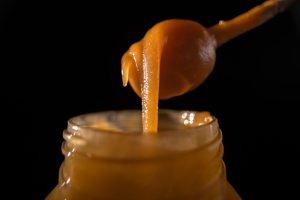With any natural health product, the challenge is to back up claims with science. Thanks to over 30 years of focused research, that’s becoming easier to do for New Zealand’s genetically unique Mānuka honey. For example, research is starting to unravel the ways in which Mānuka honey may support the immune system with a range of things from wound healing to cough and cold symptoms.
From what scientists have observed so far, New Zealand Mānuka honey appears to interact with the immune system in valuable ways.
For a start, it appears to stimulate the body’s production of cytokines, the signalling proteins that help control infection and inflammation. Cytokines help your body mount a defence against germs or other foreign substances that enter your system. The more of these immunity cells you produce, the more effectively your immune system can manage illnesses.
New Zealand Mānuka honey also has antioxidant properties. What does that mean? Well, first you need to understand free radicals. These are oxygen-carrying molecules that react easily with other molecules in your body. These reactions — called oxidation — can be both harmful or beneficial. The harmful ones cause oxidative stress, an imbalance of free radicals and antioxidants in the body, which can cause organ or tissue damage and trigger disease.
With its antioxidant properties, New Zealand Mānuka honey helps support the immune system to combat oxidative stress. While the exact mechanisms for how it does this are still being identified by scientists, its potential in this area warrants further investigation.
Whether it’s helping your immune system grow its defences, or working to balance out your system to reduce oxidative stress, one thing is for sure — Mānuka honey is a natural and delicious way to give your immunity a gentle hand to help your body function at its best.
If it’s genuine New Zealand Mānuka honey, you also know it’s no ordinary honey. It’s proven to be genetically unique and is the subject of a huge body of scientific research into its benefits — and how it can be a valuable addition to a healthy lifestyle.
Important research papers:
- Molan, P. C. (2006). The potential of honey for wound healing and anti-infection therapy. Current Drug Discovery Technologies, 2(8), 199-205. This review paper highlights Manuka honey’s potential to modulate the immune system by stimulating cytokine production, enhancing phagocytosis (white blood cell action), and reducing inflammation.
- Ruiz-Rodriguez, M. C., Sanz, M. L., Marcos, Y., Manez, S., & Nuñez, V. (2010). Honey: a potent anti-inflammatory anti-microbial and antioxidant agent. Food and Chemical Toxicology, 48(3), 1945-1950. This study suggests that Manuka honey’s anti-inflammatory properties may indirectly support the immune system by reducing inflammation associated with various chronic conditions.
- Mullen, W. P., Buckle, K. E., & Harkins, S. H. (2010). Manuka honey as a topical agent for wounds: a review of its use in modern and traditional medicine. Journal of Wound Care, 19(8), 289-299. This review mentions preclinical and clinical data suggesting Manuka honey’s ability to modulate immune responses in wound healing, promoting tissue regeneration and reducing microbial burden.
- Minden-Birkenmaier BA, Meadows MB, Cherukuri K, Smeltzer MP, Smith RA, Radic MZ, Bowlin GL. The Effect of Manuka Honey on dHL-60 Cytokine, Chemokine, and Matrix-Degrading Enzyme Release under Inflammatory Conditions. Med One. 2019;4(2):e190005. doi: 10.20900/mo.20190005. Epub 2019 Apr 25. PMID: 31245627; PMCID: PMC6594701.



